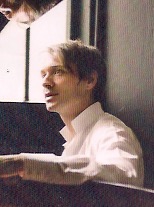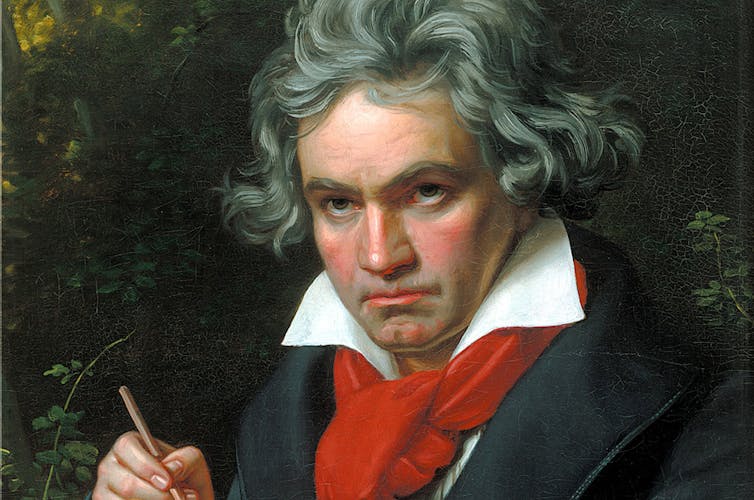New Coppola CD and interview: Celebrating miniatures
It’s heresy to say this, I know, but the great masterpieces of the 19th century piano composed by Liszt, Schumann, Schubert and Beethoven sometimes leave me exhausted. The complex structure and concentrated emotion, the moods, the arpeggios and stunning fingerwork demand an effort to reach true appreciation.
And so when I first heard the new CD “Musiques de Silence” -- interwoven selections of Frederico Mompou, matched with Maurice Ravel, Erik Satie, Henri Dutilleux, Frederic Chopin, Toru Takemitsu, Claude Debussy, Enrique Granados and early Alexander Scriabin – I felt a surge of relief. (Eloquentia EL1857).
The repertoire is selected and beautifully braided together by the rising young French pianist Guillaume Coppola.

The genius of the music is Coppola’s dogged research into relatively light repertoire to identify echos or various composers hidden away in many of the works. He studied the scores of Catalan composer Mompou’s 28 miniatures called “Musica Callada” (“The Voice of silence”) and everything else he felt was related.
About half the selections in the CD are from these nine Mompou books, including the CD title. The 19 pieces chosen for his CD might legitimately be called homage to Mompou.
The originality of the CD is twofold. First, Coppola’s delicate touch and beautiful sense of song, and secondly the linking of other composers’ bits from piece to piece.
Mompou made no secret of his admiration for Satie and Debussy, and Chopin’s genius can be felt in several of the works. The interlacings are connected in exceptionally insightful liner notes by Michel Lanour.
Coppola’s creation makes these miniatures greater than the sum of their parts. Out of them emerges a warm feeling of peace.
He has performed the combinations in recitals in France, without pause between certain groupings and only a few seconds between others. The audience is asked to withhold applause so as not to disturb the quietude of the music. “The public seems to love the combinations,” he says.
In my interview with Coppola (below) he describes how he studied Urtexts or autograph scores, vetting measure for measure in search of shared influences. The listener will hear these references effortlessly.
Here is Coppola in conversation, sitting quietly with me for an hour over an espresso at Bordeaux’s splendid Grand Hotel.
Q. You have said you did not intend to become a pianist although there was such a “dream” in your mind. Isn’t it obvious now that you were predestined to go through life together?
A. I would not exactly say predestined. My father and grandfather were both fans of popular music, so the household was musical. When I started playing, my grandfather in particular showed a personal interest although he had no musical training. When he came to visit, we went straight to the piano. He never judged me, he just listened.
Q. When did you realize the piano was taking over your life?
At 14 years of age, I was still not entirely committed but then I met France Clidat, the great interpreter of Liszt. She changed everything like a lightning bolt. After that, I felt a need to give the piano more attention. I didn’t even know what it meant to be a professional. I didn’t know it could be a full-time occupation.
Q. You have studied economics and literature. Has this helped you keep contact with the real world?
A. Yes, those are the options I chose at the lycée and I have not regretted it, although I would have liked to continue further down this path. Today in my music, that background is definitely an enrichment.
Q. Have you maintained contact with your Paris Conservatory faculty?
Yes, and it is of great importance, so rich and galvanizing. The conservatory was the first time I could devote myself to music, and discover Paris and be associated with like-minded people. There was an electricity and incredible energy. The conservatory provided such a complete education. It would be great to spend another five years there to learn more about literature, foreign languages.
Q. You must have a list of pianists who continue to inspire you?
There are many. I am as fascinated by Martha Argerich, whose superhuman capacity to master the piano approaches perfection. Radu Lupu, whose lack of ego, is remakable. Nelson Freire -- I love his féline style. I love his Chopin…
Q. Are you interested in composition?
As an adolescent I tried a bit but I stopped right away because I didn’t feel ready. It was too soon. I didn‘t feel I had enough to say. Maybe composition will come later in life.
Q. You like the contrasts and alternations in music from flamboyant to peaceful. Is there a psychological need here for calm ? You also play Liszt and Schumann…
A. Maybe it’s my Gemini personality ? I am not bipolar but there are times that passionate romantic music gives way to a calm like Debussy.
Q. Are you a Parisian today?
A. Yes and no. I live mostly in Paris but I also have a place about 40km from Lyon, and there I found real silence, interrupted only the sound of birds singing.
Q. How did you discover the Mompou oeuvre?
A. A colleague steered me to him and I was already familiar with the CDs of Volodos. Listening to his works, I felt he corresponded exactly to my new home.
Q. You studied all the Mompou “Musica Callada” pieces?
A. I studied all the pieces and I related them to other compositions. I looked at other similar composers, for example Satie’s scores, and saw the connections to Mompou.
Q. I have heard that Georgy Cziffra wept at the sight of a beautiful flower. You also seem sensitive to nature. Are flowers for you the essence of beauty and fragiillity?
A. Yes, flowers and all of nature are very important to me. I grew up near Besançon. I love city living like Paris, New York, Bangkok, but I need to return to nature too. In my country home I find that flowers stimulate me every day. I am not a believer but when I see an orchid or a passiflore, there is a mystery of nature evident. I feel the same in the presence of a tree, the sound of the birds.
Q. How do you avoid cliché when playing Liszt, Schubert, Chopin? Haven’t previous pianists already said everything there is to say? What is your secret of freshness?
A. It’s the written music. If you study the score you can always find new things. Little details will appear. Schnabel said no interpretations can be as perfect as the score itself. Everyone is searching for the holy grail. The actual writing of the composer reveals a valuable dimension of the composer’s personality.
Q. Isn’t it the notes, and the silences between the notes, that make the difference?
A. Yes, it’s the silences that allow one to breathe. If the flow is too fast, one understands nothing. Silences give a rhythm to the music.
Q. Where do contemporary composers fit into your musical life?
A. It’s a passion of mine. It’s the direct link to the innovator.
Q. You mean one can ask questions of the creator?
A. We always want to do this. Past geniuses are out of reach. Beethoven is dead.
Q. So there are no barriers of boundaries in contemporary music. With whom have you been working?
A. A major collaborator is Marc Monnet, director of Printemps des Arts of Monte Carlo. We created four pieces together with hypercomplicated rhythms. But working closely with him one understands that complexity is natural. Talking with him, one understands. I have been working with Gao Ping, Steven Stucky, Sylvain Griotto, Florentine Mulsant and Isabel Pires.
Q. What is your view of the growing virtuosity of the younger generation of pianists?
A. Virtuosity is necessity in some music – certain great works demand brio, panache. But the younger generations sometimes miss the musical message. When Schubert wrote a rapid scale, it was not to show off, but to express a passionate message, an anguish, a disturbance. Virtuosity should always be the expression of a message. Playing fast for its own sake misses the intention of the composer.
Q. For ten or twenty years we have been talking of the Chinese piano explosion – 20 million young Chinese trying to master the Western canon. Now we hear that number has jumped to 60 million. Does this worry you?
A. This is a vast subject. It is true that many Asians love Western music. Sometimes they are not up to the task. It’s a new language for them. Imagine trying to understand Chinese opera or Korean traditional music. We cannot even play it.
Q. But they are determined to cross the barrier while our young people are turning away from classical music.
A. Yes, our own cultural message is being lost. Mainly the older generations attend the concerts in the Western world today. I don’t know what to think about it. The young Koreans love our culture. They are ready to devote themselves to it. A lot of young people attend concerts in Korea. Here there’s not the same level of passion, even when a teacher plays.
Q. What are our young people doing with their lives?
A. I am not even sure there is a passion today. They are focused on their phones and computers. Being hooked on video games means there is no need to reflect. It’s entertainment. Like television. It occupies the brain’s available time. It’s worrying.
END
This article is brought to you by the author who owns the copyright to the text.
Should you want to support the author’s creative work you can use the PayPal “Donate” button below.
Your donation is a transaction between you and the author. The proceeds go directly to the author’s PayPal account in full less PayPal’s commission.
Facts & Arts neither receives information about you, nor of your donation, nor does Facts & Arts receive a commission.
Facts & Arts does not pay the author, nor takes paid by the author, for the posting of the author's material on Facts & Arts. Facts & Arts finances its operations by selling advertising space.




















